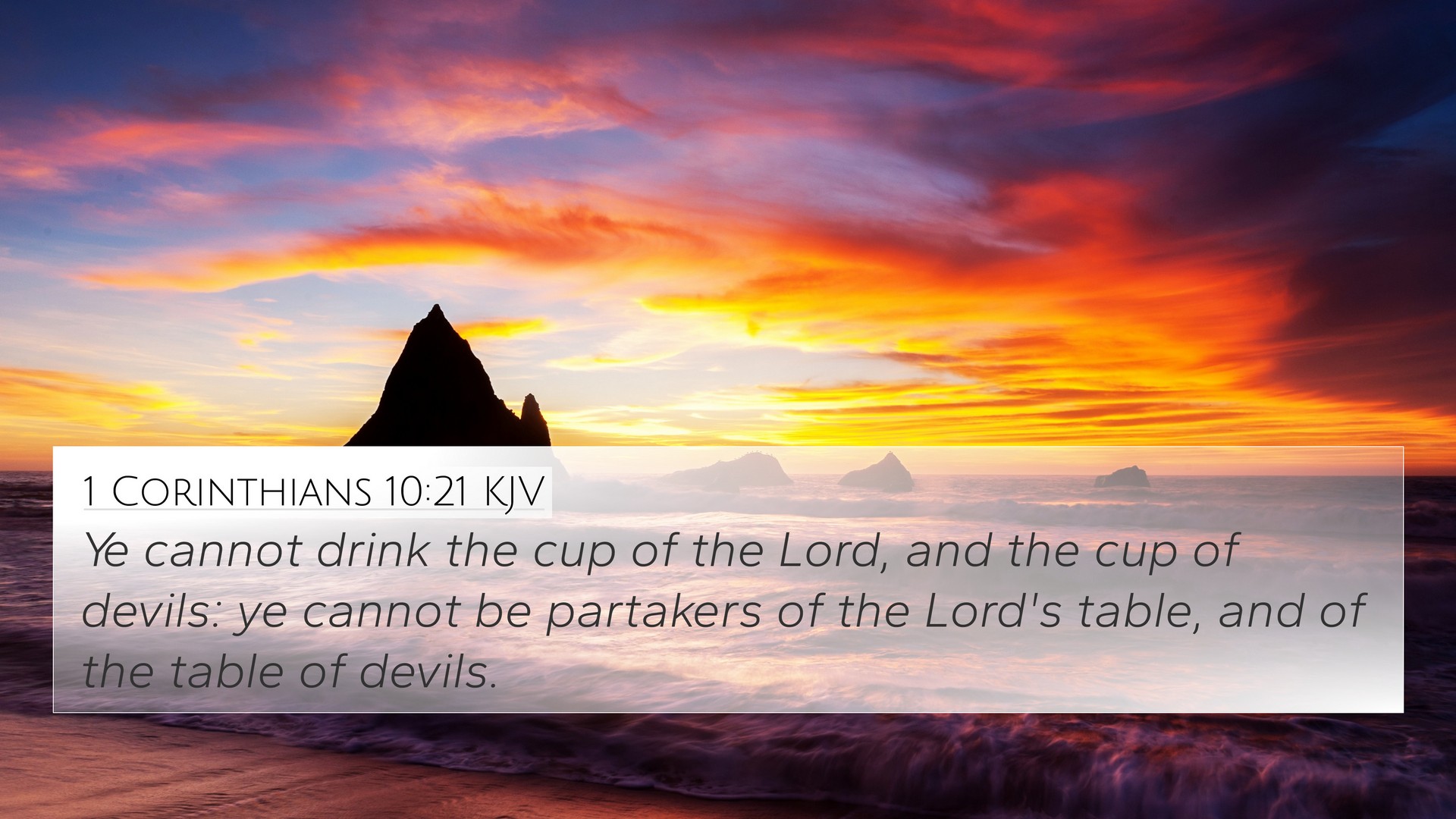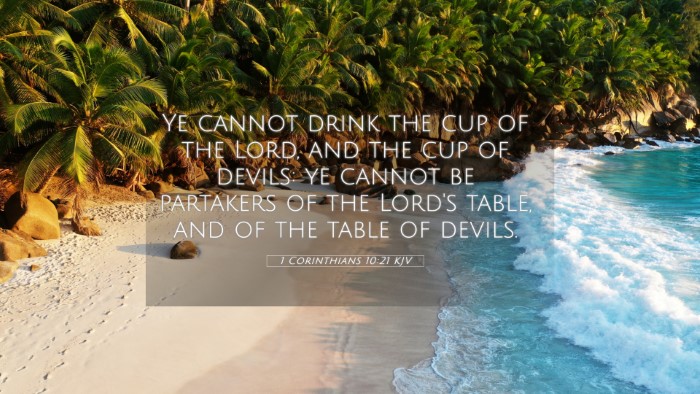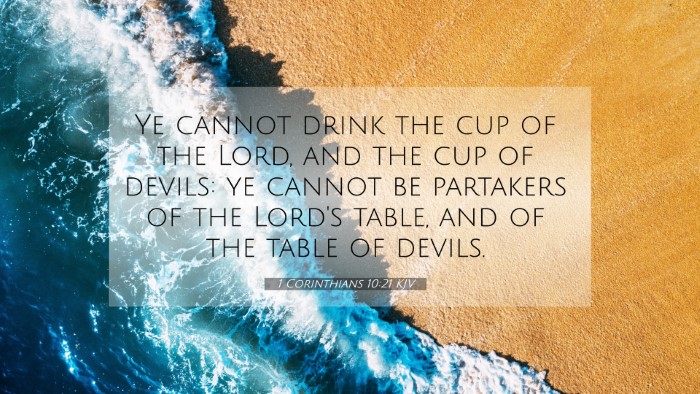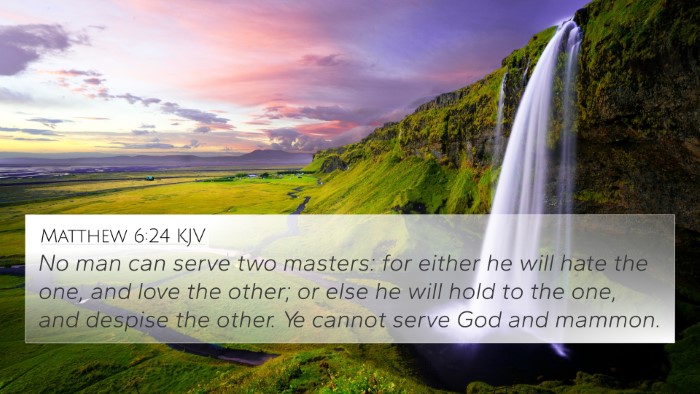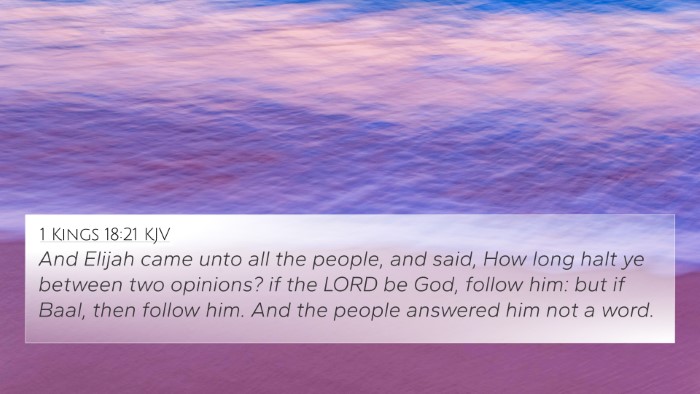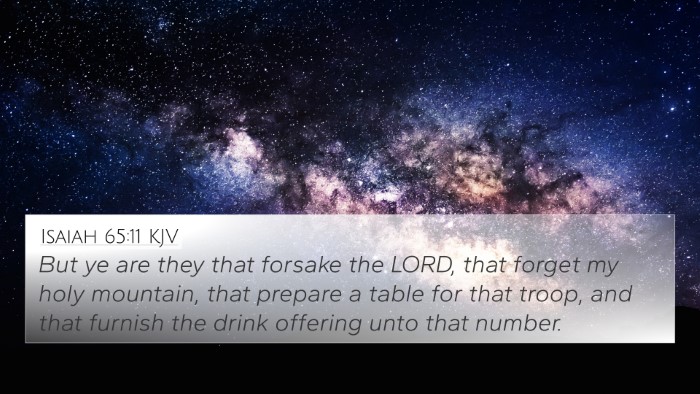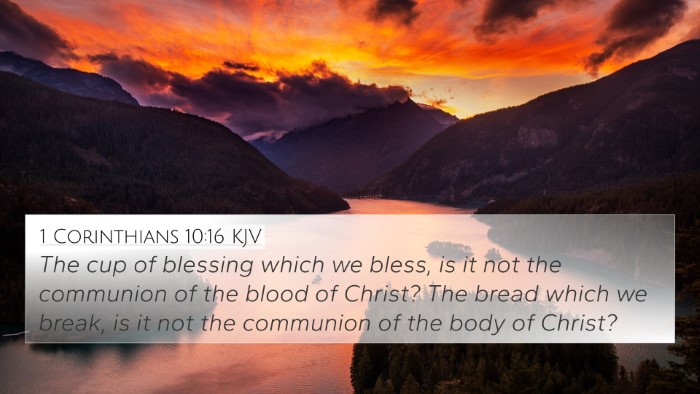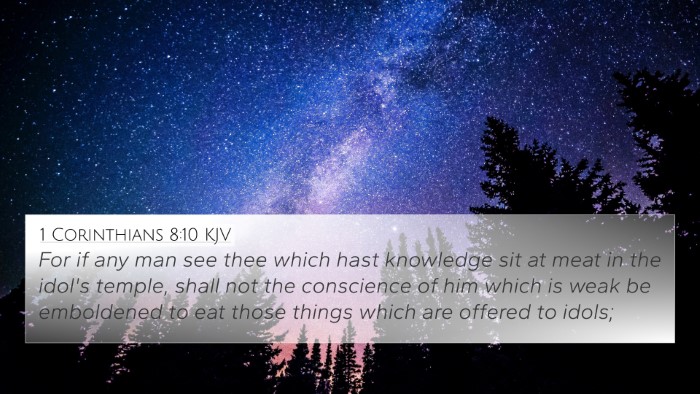Understanding 1 Corinthians 10:21
Verse: "You cannot drink the cup of the Lord and the cup of demons. You cannot partake of the table of the Lord and the table of demons." (1 Corinthians 10:21)
Summary of Meaning
This verse addresses the incompatibility of serving God and engaging in idolatry. The Apostle Paul emphasizes a pivotal spiritual principle: believers cannot simultaneously partake in the holy and the profane. This duality reflects the essence of commitment to Christ and the necessity of living a life that honors God without compromise.
Insights from Public Domain Commentaries
-
Matthew Henry: Henry explains that the Corinthians were trying to incorporate their Christian faith with their idol worship. He indicates that such actions not only undermine the purity of their devotion but also invite spiritual conflict. Believers must choose whom they will serve.
-
Albert Barnes: Barnes offers an exploration of the distinctions between sacred and profane. He highlights that the blood of Christ allows believers to be part of God's family, and thus, they should not revert to practices associated with pagan rituals. The stark warning implies that both participation and communion with demons are spiritually detrimental.
-
Adam Clarke: Clarke underscores the significance of communion, stressing that partaking in the Lord's Supper signifies a covenant relationship with God. He warns that sharing in the sacrifices of demons is tantamount to breaking that covenant, illustrating a fundamental dichotomy in Christian faith and practice.
Connections to Other Bible Verses
1 Corinthians 10:21 correlates with several other scriptures highlighting the theme of commitment to God and the rejection of idolatry. Below are notable cross-references:
- Exodus 23:24: "You shall not bow down to their gods, nor serve them, nor do according to their works; but you shall utterly overthrow them and completely break down their sacred pillars." - This verse sets a foundational theme of rejecting other gods.
- James 4:4: "Adulterers! Do you not know that friendship with the world is enmity with God? Whoever therefore wants to be a friend of the world makes himself an enemy of God." - Emphasizing the conflict between worldly desires and devotion to God.
- 1 John 5:21: "Little children, keep yourselves from idols. Amen." - A succinct reminder to avoid idols and remains devoted to God.
- Matthew 6:24: "No one can serve two masters; for either he will hate the one and love the other, or else he will be loyal to the one and despise the other." - Reinforcing the principle of singular devotion to God.
- 2 Corinthians 6:14: "Do not be unequally yoked together with unbelievers. For what fellowship has righteousness with lawlessness? And what communion has light with darkness?" - Further highlighting the need for separation from non-God influences.
- Romans 12:1-2: "I beseech you therefore, brethren, by the mercies of God, that you present your bodies a living sacrifice, holy, acceptable to God, which is your reasonable service." - Calls for total surrender and purity in service to God.
- Galatians 5:17: "For the flesh lusts against the Spirit, and the Spirit against the flesh; and these are contrary to one another, so that you do not do the things that you wish." - Illustrating the internal conflict faced by believers striving for holiness.
Thematic Bible Verse Connections
1 Corinthians 10:21 serves as a critical link in understanding the overall biblical narrative regarding faithfulness and devotion to God. By exploring inter-Biblical dialogue, we can see:
- Idolatry as a recurring theme: Idolatry is condemned throughout both Old and New Testaments, revealing God's desire for exclusive worship.
- Communion with God: The concept of communion, highlighted in this verse, is a prevalent theme from the Passover to the Lord's Supper, emphasizing sacred covenantal relationships.
- Faith and works: The connection between belief and action underscores a lifelong commitment requiring believers to actively pursue righteousness.
Cross-Referencing Bible Study Methods
When assessing 1 Corinthians 10:21, various tools for Bible cross-referencing can enrich understanding:
- Bible Concordance: A comprehensive tool that helps locate specific words and phrases across scripture.
- Bible Cross-reference Guide: Provides structured links between verses that discuss similar themes or messages.
- Bible Reference Resources: Encompasses commentaries, dictionaries, and maps that deepen contextual understanding.
- Cross-reference Bible Study: A method that involves examining connected scriptures to unearth deeper meaning.
- Bible Chain References: A technique where verses are connected in a sequential chain to illustrate a particular thought or theme.
Conclusion
Understanding 1 Corinthians 10:21 requires careful study and willingness to respond to its warning against idolatry. By engaging with commentaries and cross-referencing with related scriptures, believers can grasp the gravity of commitment to God and the dangers posed by divided loyalties. This verse serves as a foundational reminder that one’s spiritual journey necessitates intentional choices that honor God and reject the lesser paths of worldly influences.
